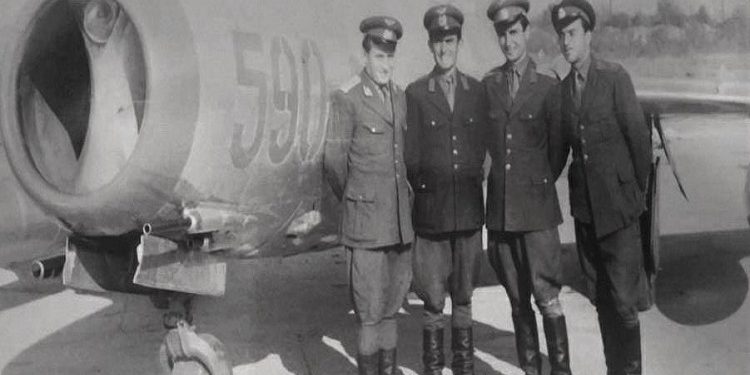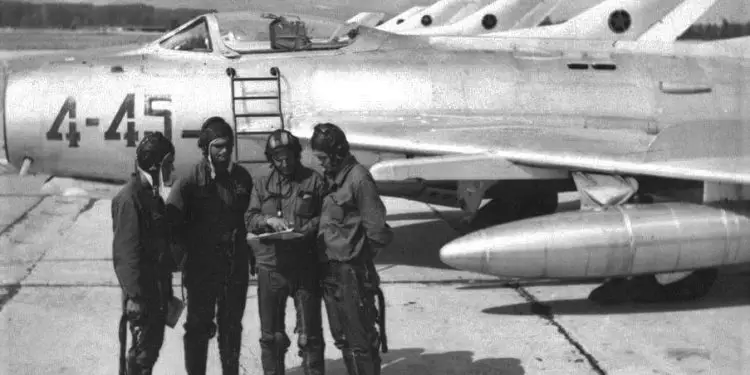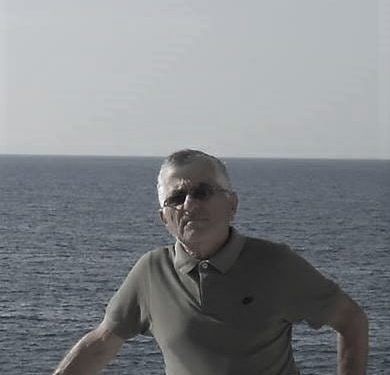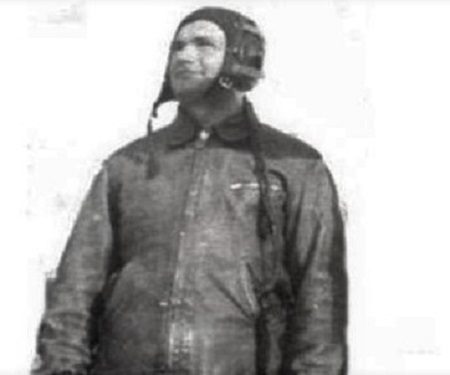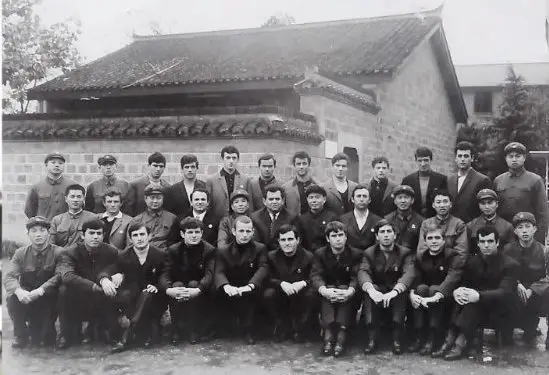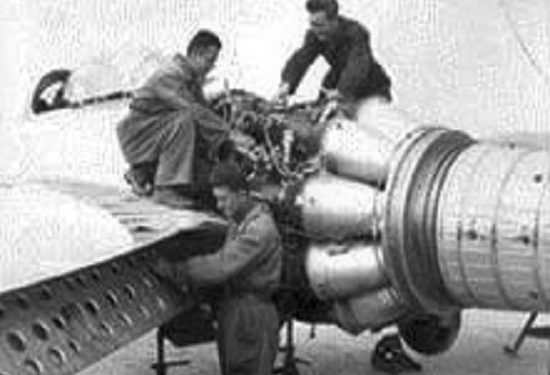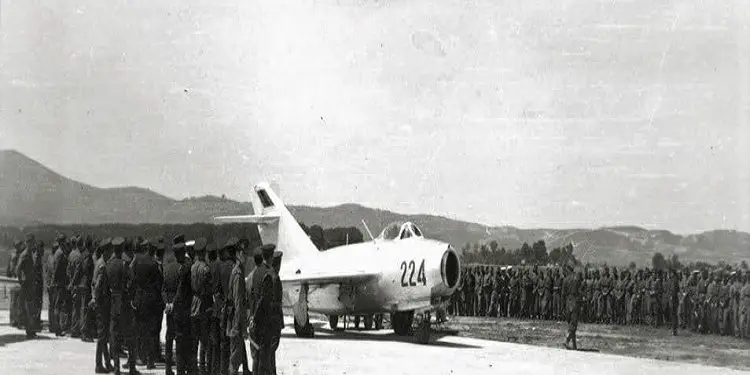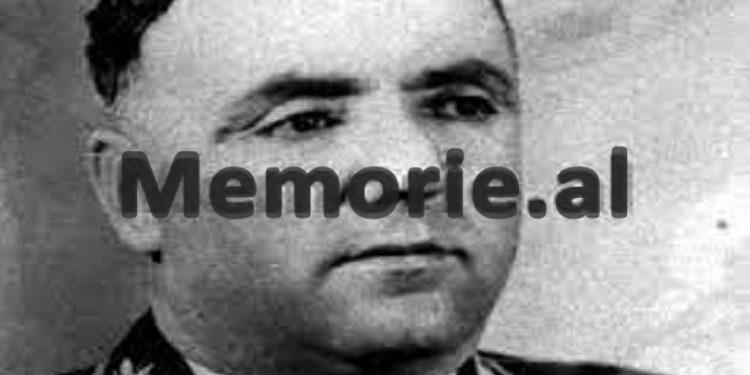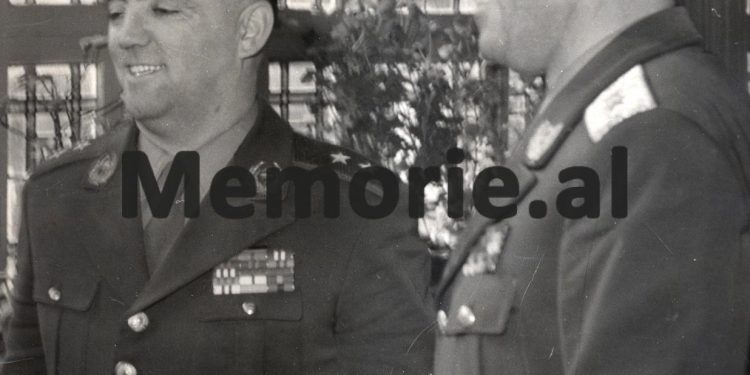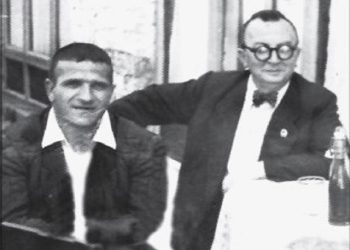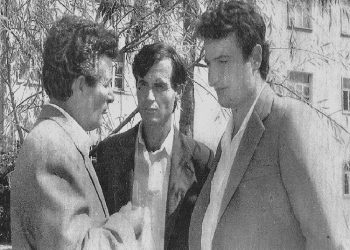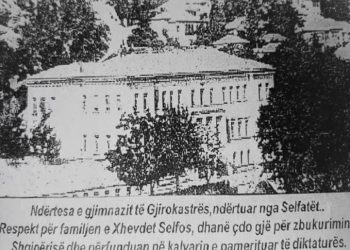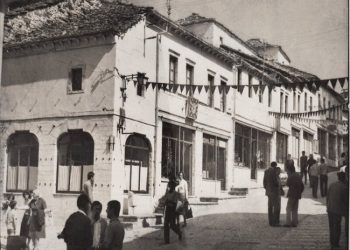By Nizai Nelaj
The sixth part
– At the Chinese Military Aviation School –
Memorie.al / Expelled from the Soviet School of Aviation, with dreams cut in half, part of the group of student pilots, who had studied for a year in the city of Bataysk, on January 8, 1962, after a “hell” cruise ”, with a cargo ship, we arrived at the center of China’s Third Military Aviation School in Chin Zhou City. It is located in the “heart” of Manchuria; at that time there were about 200,000 inhabitants. Without any prominent industry. A city with 2-3 story buildings but paved roads. The terrain around the city was plain; next to it are the Western shores of the Yellow Sea. One of the values of this city was the fact that it was the center of China’s Third Military Aviation School. My going to this school and that city was a lucky chance. In the list of 7 students of our course, which included: Adem Çeça, Dhori Zhezha, Mihal Pano, Bashkim Agolli, Andrea Toli and Sherif Hajnaj (Bracki), my name, Niazi Nelaj, was included, quite by chance?
Continues from last issue
Perhaps the reader has the curiosity and courage to ask me: “These Chinese do not make love to each other?” How did those people increase so much? I would honestly answer the benevolent inquisitors: “They made love and what love”! I had seen them, with my own eyes, although in rare cases, how they plied each other, how they licked and screamed, out of embarrassment. Men were jealous of foreigners. Precisely, in the ranks of the men, jealousy was most evident; for truth’s sake, the women were closer.
We were 7 friends in the group. Only one; the musketeer Dhori Nasi Zhezha, a pure and very sincere but a little credulous boy, integrated better than us into the life of the Chinese. He was constantly among them, played with them, skated, played ping-pong, and even learned to do acupuncture. Since our friend stayed more with the locals than with us, we jokingly “baptized” him: “Dhori Chinesei”. The other Myzeqari Spiro Moçka, from Novosela in Vlora, really could not become a pilot, but he learned to write and read, in the difficult Chinese language. The rest of us remained illiterate. I learned to write and read only the hieroglyphs that symbolize my last name: Ney Laj, which means: “Come in.” Learning Chinese was quite difficult.
Children continued primary school for a few years, just to learn how to read and write. I had heard that only Professor Go Mo Zho knew the hieroglyphs of the Chinese language (I don’t know their exact meaning). We had gone for a qualification, and we didn’t want to worry about learning the language. Therefore, we found a way to communicate in Russian, with the help of translators.
Our school, in the city of Chin Zhou, was about 30 minutes’ walk from the city center. One day, together with my closest friend – Sheriff Çelo Hajnaj (Braski) we decided to go out without permission in the city. We had experience. In Batajsk, during an unauthorized outing, a group of students challenged the school commander, Colonel Volkov, who, in a “Gaz-69” car, came later from us to the school. From the Chinese school, it was not difficult to leave without permission.
The surrounding walls were no higher than 2 m., and we could easily jump over the wall. The Chinese did not even think of leaving without permission. The Sheriff and I agreed to go out without permission. Just run away, we said to each other, without letting it go anywhere. In order to realize the “escape”, we thought of using a day when there was shopping in the city. A stream of people that day moved, on foot, from the West, to the city, walking along a road that passed by the perimeter of our school.
We dressed in civilian clothes, which we kept in the closets, and left. We crossed the surrounding wall and joined the crowd. We forgot that we, from the outside, the locals would spot us from afar. In Tirana they say: “Je bo si pare red”. Our “adventure” by the Chamorro teenager quickly caught the attention of the Chinese. The passers-by, who noticed us, turned their heads in surprise, whispered something to each other and continued on their way. When they walked like that, without line and without order, they resembled that flock of sheep that goes to water sources to quench their thirst.
The clothes of those who walked in the column, without noise or fuss, were almost the same: trousers, seter (a kind of jacket), with or without a hat. The jackets were closed, up to the neck. We had the jackets open, mono stitched or double stitched. We stand out not only from the face, but also from the uniform. That day we escaped the “cover of the translators”, who, surely, when they learned that we had both left the school, they must have cursed their bad luck that made us disappear from their sight.
There was an unprecedented variety of people in the crowd. Men, women, young girls, young boys, one by one, in each other’s company. They walked without feeling. Some women, aged above the average (about 50 years old), who were walking in front of us, could barely walk. They walked “like geese”. Their well-developed bodies contrasted with their small legs. According to imperial tradition, the women of the Han sect, one of the oldest and most powerful dynasties in China, no imperial woman should have a foot larger than the size of the empress’s foot.
In order to prevent the leg from growing, women were put on some wooden casts from childhood, and as the body developed normally, the leg remained small. Even after the revolutionary changes that 1949 brought, this defect was irreparable. We quickened our pace and easily passed our strange companions.
We thought of communicating with someone from those who were going to the city. We would use our “miserable” dictionary, which consisted of general words, from those used to ask for food, water or to ask about x and y place, road, etc. We caught sight of two boys of our age, who were well dressed, not as their fellow travelers. They wore long hair and smoked cigarettes. We thought of them as “trendy” guys and we spoke to them in their language.
In our Alla-Albanian Chinese, we asked the boys to light our cigarettes. We both smoked cigarettes and had they ready, lit. Both boys understood our request and, as if by military command, took out matches from their pockets. The most agile of them, with a chivalrous gesture, pointed the lighted match at us. When they saw us in the face and we did not look like theirs, the Chinese teenagers were stunned; they were surprised and, without waiting for us to thank them, with the words: “Se- se a”! What we knew, they quickened their pace and left us. As if nothing had happened to us, we continued the road, towards the city center.
Before we reached the first intersection, before we turned to go to the shop where the pretty girl was selling, we were cut off by a school staff officer driving a new Soviet-made tricycle. He stopped the motorcycle in front of our feet and invited us to sit on the tricycle. One of us settled in the basket, the other took a seat behind the “boss”. We recognized the “boss” with sly eyes under myopic glasses.
It was one of the staff officers, who did not have close working relations with us. He burst out laughing and didn’t say a word to us. We left for school, sulking, without triumph. On the way I thought: “kill these Chinese with cotton wool, they have the perfect information.” Before we even arrived in the city center, the tricycle came.” when we entered the post-block of the school, the guard soldier at the door, when he saw us in the company of his boss, honored us with his fist and laughed. No one treated us at school. Even later, they didn’t stop talking about our stupidity.
We made the waterway to China together with a group of officers, who had flown to Krasnodar, in front-line bomber planes, ‘IL-28’. In China, they would specialize in flying MiG-15 Bis fighter-bombers. In that group were the officers: Vaskë Nikolla; Baftjar Metaj; Myrteza Arabi; Shuaip Nurja; Atlantic Buzo; Joy Robert Marko’s Pizza.
With them, together we went to Beijing; then their group went to the city where another group of officers were waiting for them, which included: Sotir Majko; Muco Mucaj; Servet Murat; Niko Cendro; Raif Hoxha; Servet Muka; Release Cocona; Pandeli Priest; Divin Abazi; Bilush Imeraj and Çerçiz Zeka. The two groups of officers were joined and would fly in Mig-15 Bis aircraft, according to differentiated programs.
They were indeed titled officers, in Albania, when they were forcibly returned from the Soviet Union, but none of them had graduated as pilots. As for the salary, they did not receive it as officers, but as we who were students. The “blunder” was made by the commander of the Albanian Aviation, Colonel Edip Ohri, who was a participant in the talks between the high delegation of our Army and that of the Chinese Liberation Army.
To this day, I cannot understand the logic of that commander who told his Chinese interlocutors that: “Treat ours the same as yours”! Based on this “blessing”, which I don’t like to give a name to from those who deserve it, the Chinese Aviation authorities saw fit to put us “in a bag”, and treat us equally, like officers and students , Theirs.
First of all, our officers were not even given their salaries, not only in China, but also to their families in Albania. This undeserved treatment revolted our Aviation Officers, who made several dissensions, to no avail, and finally refused, as a group, to begin the theoretical and practical program. In order to put pressure on the revolted officers and to teach us students not to follow their example, the authorities of our Ministry of Defense ordered the return to Albania of the group of pilot officers, without exception.
That group, in whose composition there were talents that promised a lot in the field of piloting, was “pruned” without criteria and disintegrated badly. Only one, (Servet Murati), after a few years, with his insistence, returned to flying in the jet planes for which he had learned and reached the highest spheres of Aviation management, (Commander of the High School of Aviation). Baftjar Metaj also returned to flying, but in the ‘Mi-4’ helicopters and Gëzim Picari, instructor, in the initial training aircraft, with propellers, Type-61.
A hasty and not properly thought out decision did an incalculable damage to the weapon of our Aviation. Albanian Aviation was full of problems; mediocrity added a big trouble. I get shivers through my body, even today, when I remember that the talented (almost ungraduated) pilot Bilush Imeraj, not only was released from the army, but, when he returned to Albania, the angry authorities of the army and the Aviation, did not they did not give him any kind of work; at least as his friends, of the same fate. Bilushi, unsupported, in order to cope with life, was forced to go shepherding, with sheep, to the flocks of sheep of the Agricultural Cooperative of the village “Asim Zeneli”. What irony? Let everyone think this, but by throwing it at him!
In the fall of 1962, a large delegation of the People’s Army headed by General Petrit Dume, then Chief of the Army General Staff, came to China. In the composition of the delegation, there were senior officers of various specialties, with the authority to sign arms supply contracts. As it seems, this was the agenda of the visit of this delegation.
We were told to go, as a matter of urgency, to a meeting with the Albanian military delegation, in the Manchurian city of Shen Jan (Mukden), which, at that time, was several million people, and to take notice of those factory chimneys, dense and high which , emitting smoke for 24 hours without stopping. We arrived in the city early in the morning and by the time it was time for the meeting, we settled into a fairly modern, luxurious tourist hotel. We were used to being monitored by our “interpreters”, at every step, but I had never seen that in every corner of the hotel corridor, I saw a man, sitting in a chair, pretending to read the newspaper.
Their presence caused me some annoyance and allergy. I did not believe that they were vacationers or tourists who were so interested in reading the press. My mind told me that they might be people from the Chinese intelligence service. There were such people everywhere, in every country, even here, only the working methods changed, while the tasks remained the same; protecting the interests of the respective state.
We settled on the top floor of the luxury hotel; the meeting with the military delegation from Albania would take place in a hall, on its first floor. We had to get down early, to wait for the big boss and his accompanying suite. Together with the student from Durrës, Perlat Lako, a boy who had all the good qualities that a man can have, we took the elevator to go down from the fifth floor where we were; in the first.
We were surprised and amazed when a “perri” entered the elevator. Next to us stood a girl in her twenties, beautiful as a star. She surprised us and left us speechless. We were so close to him that we could not say a word to him. Not only did we not know in which language he communicated, but we did not dare. Her beauty “killed us”. They both got better. It seemed to us as if we were in a beautiful dream which we did not want to end. We looked at him with haunted eyes; as if we were to digest it. She also looked at us and smiled sweetly. When she put her lips to gas, she looked even more beautiful.
They say that the longest dream lasts about 3-4 seconds. I think it took us that long to get down to the first floor. With “pain” we let that rare beauty get out of the elevator first. He left through the lobby of the hotel, in small shoes and all coquetry. A real, seductive coquette. She took with her all that glow of beauty and those girlish graces, which came to us as a gift for just a few seconds!
When the two of us remained, with Perlat, whom I was a very good friend of; we played ping-pong together and made “serious” jokes, in privacy, we exchanged some childhood opinions. We asked each other how we felt in the presence of that beauty from Japan, who came and went, like a flash of lightning, and left us stunned, as if in a hypnosis. Both, each in his solitude, had endured something that did not happen.
I said to my good friend, the soulful human being that my knees trembled when I looked at that special human being, what about you, Perlat? Same thing happened to me, said the other, honestly. The conclusion was one: We both suffered from the same “disease”. With this feeling of satisfaction, we joined our friends and entered the meeting room. We cursed ourselves and our fate for staying so little near her. It seemed to us as if he had separated himself from the stars, to tempt us “wretched people”, and he had run away back to where he came from.
In the hall, take a seat on the plate. The first row of the plate was reserved for the members of the military delegation from Albania. They were in leadership positions, in the Ministry of Defense and in the units of our Army. With high ranks and functions, dressed and with leather bags, fine, in the hands. We, the student pilots, of both learning groups, took our seats behind them and waited for the important statesman.
We stood dumbfounded, as if guilty. We had heard about his “deeds” and the strictness that characterized him in his relations with subordinates, but we did not know him physically. The honorable chief, General Petrit Dume, entered the hall. As if on command, we went on foot. Someone from the suite reported him. The Chief of the General Staff of the Army, with that body not tall, rather round, with hair falling in front and some long turbans which he had thrown to the side (to cover the brick), sat alone in front of us , in an armchair. We anticipated that we would have a difficult conversation.
We had gone so far, to learn to fly, we had left behind kind and sorolop, who were waiting for us and we did not want to suffer the fate of our fellow officers, who sent them back to the Motherland, as they used to say then: “postal package”. The boss started the conversation. He was gagging. It was, as the Korçars say: stuttering. We became eyes and ears, ready to digest his every word, hoping he wouldn’t show us anything new from Albania, which we longed for.
The first words of the big boss were too heavy and disorienting for us. He, in the midst of that eerie silence, with a strong voice but stammering said: “P. . . o. . . j. . u. . . q. . . u. . . str. . . a. . . sh. . . e. . . wow, why don’t they like China?! His words were like lightning in the open sky. We heard his accusation and cowered in the chairs where we were sitting. The boss invited us to answer, but we didn’t want to talk. Silence.
After a while, Jorgo Tabaku, a student from the village of Hoçisht in the district of Korça, became a pilot. Comrade General, said courageously: “We like China, but we ask that some conditions be met, for which there are full possibilities, but something stands in the way.” Then, the statesman, without finding the words to oppose the logic of our friend, whose demands were also ours, with a gesture of swashbuckler, gave an order to his obedient companion: “This bashibozuk, immediately return to Albania”! Memorie.al
The next issue follows




